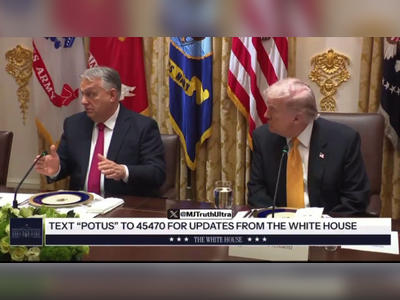Trump's Massive Budget Proposal: Tax Cuts and Spending Cuts at the Forefront
The proposed budget legislation aims to extend significant tax credits and introduce substantial spending cuts, impacting various sectors of American society.
The proposed legislation known as the "One Big Beautiful Big Act" has been narrowly passed by the House of Representatives and is currently undergoing scrutiny in the Senate.
This 116-page bill is a central component of former President Donald Trump's presidential agenda, notably extending large tax credits from his first term that are set to expire at the end of the year.
The Republican proposal includes maintaining income and estate tax cuts for wealthier households and exempting tips, overtime pay, and certain auto loan interest payments from taxation.
These measures have been criticized for disproportionately benefiting high-income earners while potentially neglecting a working class already burdened by inflation.
Independent analysts suggest that prolonging the sizable tax credits from Trump’s initial term could increase the federal deficit by an estimated $2 trillion to $4 trillion over the next decade.
The legislation also proposes raising the cap on state and local tax deductions from $10,000 to $40,000 for taxpayers earning less than $500,000 per year.
Additionally, it includes a $500 tax credit for families with dependent children.
The proposed budget cuts could adversely affect millions of Americans who rely on Medicaid, a healthcare program for low-income individuals.
Surveys indicate that a significant majority of Americans oppose the proposed restrictions on Medicaid, which include prohibiting funding for abortion services and gender transition healthcare.
The Congressional Budget Office estimates that the combination of tax cuts and extensive budget cuts would result in a massive transfer of wealth from the lowest 10% of earners to the highest 10% in the country.
In the realm of education, eligibility criteria for federal student aid are expected to become more stringent.
The bill proposes a tax increase of up to 21% on certain university endowments, primarily targeting large private universities with substantial reserve funds.
Politically, the debates surrounding this expansive budget proposal are anticipated to significantly influence the 2026 midterm elections, which traditionally pose challenges for the governing majority.
Reactions from high-profile figures have varied, with Elon Musk, a former advisor to Trump, labeling the proposal an "abomination disgusting." In response, White House Press Secretary Karoline Leavitt stated that the administration remains steadfast in its support of the legislation, asserting that it is designed to stimulate economic growth.
This 116-page bill is a central component of former President Donald Trump's presidential agenda, notably extending large tax credits from his first term that are set to expire at the end of the year.
The Republican proposal includes maintaining income and estate tax cuts for wealthier households and exempting tips, overtime pay, and certain auto loan interest payments from taxation.
These measures have been criticized for disproportionately benefiting high-income earners while potentially neglecting a working class already burdened by inflation.
Independent analysts suggest that prolonging the sizable tax credits from Trump’s initial term could increase the federal deficit by an estimated $2 trillion to $4 trillion over the next decade.
The legislation also proposes raising the cap on state and local tax deductions from $10,000 to $40,000 for taxpayers earning less than $500,000 per year.
Additionally, it includes a $500 tax credit for families with dependent children.
The proposed budget cuts could adversely affect millions of Americans who rely on Medicaid, a healthcare program for low-income individuals.
Surveys indicate that a significant majority of Americans oppose the proposed restrictions on Medicaid, which include prohibiting funding for abortion services and gender transition healthcare.
The Congressional Budget Office estimates that the combination of tax cuts and extensive budget cuts would result in a massive transfer of wealth from the lowest 10% of earners to the highest 10% in the country.
In the realm of education, eligibility criteria for federal student aid are expected to become more stringent.
The bill proposes a tax increase of up to 21% on certain university endowments, primarily targeting large private universities with substantial reserve funds.
Politically, the debates surrounding this expansive budget proposal are anticipated to significantly influence the 2026 midterm elections, which traditionally pose challenges for the governing majority.
Reactions from high-profile figures have varied, with Elon Musk, a former advisor to Trump, labeling the proposal an "abomination disgusting." In response, White House Press Secretary Karoline Leavitt stated that the administration remains steadfast in its support of the legislation, asserting that it is designed to stimulate economic growth.









